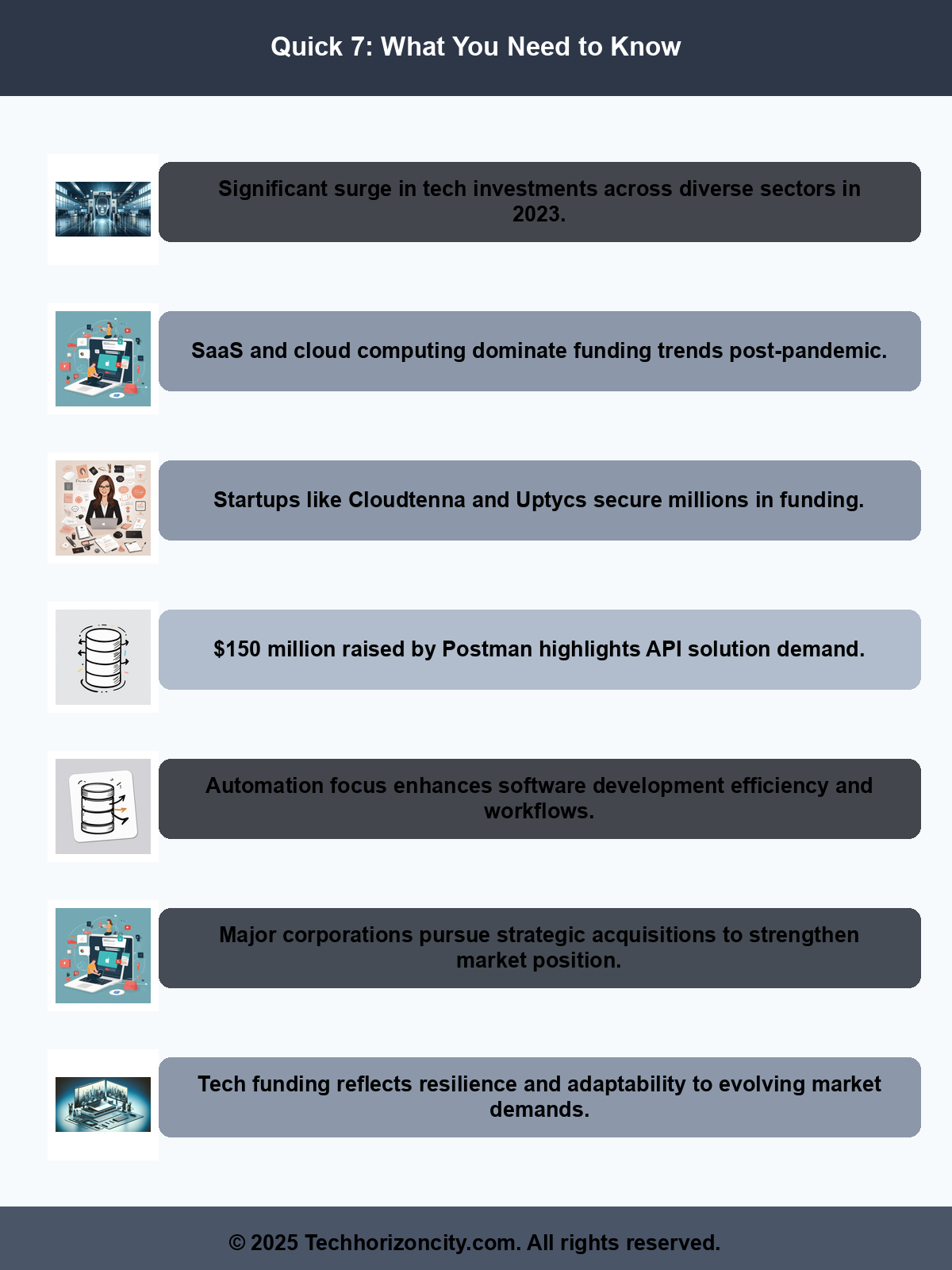Executive Summary
The tech industry is witnessing a transformative shift characterized by significant funding rounds and strategic initiatives aimed at enhancing operational efficiency and driving digital transformation. Recent developments reveal a wave of investment in various technology sectors, particularly SaaS and cloud computing. This post delves into the implications of these changes, the responses from enterprises adapting to a post-pandemic world, and the promising ventures emerging in the startup ecosystem. The surge in funding is not merely a reflection of financial health; it portrays a broader narrative of resilience and adaptability in the face of evolving market demands.

Background Context
The tech industry has long been a playground for innovation, but the COVID-19 pandemic accelerated many existing trends, particularly the shift toward cloud solutions and remote work. Companies rapidly adopted digital tools to ensure continuity and efficiency, resulting in a robust demand for scalable SaaS solutions. As organizations pivoted to remote operations, the need for tools that support digital workflows and enhance collaboration became paramount.
For technical resources and innovative solutions, please visit EchoesOfCreationUS for specialized technical resources.
Investments in technology startups have surged, with significant funding rounds reported across diverse sectors. Recent highlights include Cloudtenna’s impressive $2.5 million raise for a mobile search application and Uptycs securing $30 million in Series B funding to bolster its cloud security offerings. Meanwhile, established players like Dropbox and Box have rolled out new features designed to streamline user experience in both business and personal environments, reflecting an ongoing commitment to innovation.
Analysis of Implications
The influx of capital into the tech space indicates a strong belief among investors in the longevity and scalability of cloud-based solutions. For instance, the $150 million Series C funding raised by Postman, propelling the company to a $2 billion valuation, underscores the growing reliance on API solutions as businesses strive for greater interoperability in their software ecosystems.
Discover exclusive offers and premium content at Active Living Offers – your gateway to enhanced productivity and lifestyle solutions.
Moreover, startups such as DeepSource, which recently raised $2.6 million for static code analysis automation, highlight a critical focus on enhancing software development processes. The emphasis on automation and efficiency is a clear response to the challenges faced during the pandemic and reflects a broader trend towards reducing operational friction in technology workflows.
Industry Impact Assessment
The current funding landscape is reshaping the tech ecosystem. As major corporations like Salesforce and NetApp engage in strategic acquisitions, such as Salesforce’s appointment of David Schmaier as CEO of Salesforce Industries and NetApp’s acquisition of Spot, the competitive dynamics of the market are evolving. These moves signal an emphasis on strengthening existing product offerings while leveraging new technologies for competitive advantage.
Furthermore, the transition of companies like Liberty Mutual to remote work for 44,000 employees exemplifies the new normal within corporate America. This shift not only necessitates enhanced digital tools but also presents opportunities for startups focused on remote work solutions, data quality monitoring, and onboarding processes. For instance, Flatfile’s recent $7.6 million seed investment emphasizes the necessity of effective data management in an increasingly digital workspace.
Future Outlook
Looking ahead, the tech industry appears poised for continued growth, driven by innovations in cloud computing and an emphasis on automation. The rise of AI-driven technologies, as exhibited by Searchable.ai’s additional $4 million in seed funding, suggests that businesses will increasingly turn to artificial intelligence to gain a competitive edge.
As we navigate the post-pandemic landscape, it is likely that the investments in technology will not only continue but also diversify. With regions like Tulsa developing their startup ecosystems, we may see a geographical expansion of innovation hubs beyond traditional tech centers like Silicon Valley. This democratization of tech entrepreneurship could lead to a more diverse range of solutions tailored to varied market demands.
Conclusion with Key Takeaways
In summary, the tech industry’s rapid evolution is underscored by significant investment and innovation, particularly in the realms of cloud computing and SaaS. Companies are adapting to new operational realities, with a clear shift towards digital solutions that enhance productivity and efficiency. As we look to the future, the ongoing trend of substantial funding in tech startups indicates a robust belief in the sector’s potential to shape the next phase of digital transformation. Key takeaways include:
- The focus on cloud-based solutions will persist as organizations prioritize operational efficiency.
- Investments in startups are becoming more diverse, indicating a broader range of solutions emerging from various geographical regions.
- The integration of AI technologies will play a critical role in driving innovation in the years to come.
Disclaimer: This article was independently created based on publicly available information and industry analysis.
